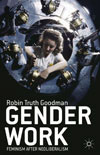 In her role as a senator for the United Faculty of Florida at Florida State and bargaining team member for the faculty union, Robin Goodman puts to use her extensive knowledge and understanding of labor issues to help give her fellow faculty members another voice with university administrators.
In her role as a senator for the United Faculty of Florida at Florida State and bargaining team member for the faculty union, Robin Goodman puts to use her extensive knowledge and understanding of labor issues to help give her fellow faculty members another voice with university administrators.
In her latest publication, Gender Work: Feminism After Neoliberalism (Palgrave Macmillan, 2013), Goodman sharpens her focus and calls upon feminist theorists to "reconsider the relationship between labor and gender because labor currently has acquired a reemergent public relevance." Gender Work, she continues in her introduction, "considers ways that neoliberal ideological forces depend on the production of femininity, and how femininity clears a symbolic space through which the 'free reproductive labor' of actions, traits, sensibilities, and affects linked to gender can be reconceived in capitalizable form."
 Gender Work is Goodman's sixth book publication, and it "indicates how literature and critical theory construct femininity in conformity with neoliberal rule as well as how such constructions of femininity might contest the production of gender for alienable profit." She adds that her research and conclusions presented in Gender Work are historical—she "traces the cultural contextualization of 'women's work' from its Marxist roots to its current practices"—and timely.
Gender Work is Goodman's sixth book publication, and it "indicates how literature and critical theory construct femininity in conformity with neoliberal rule as well as how such constructions of femininity might contest the production of gender for alienable profit." She adds that her research and conclusions presented in Gender Work are historical—she "traces the cultural contextualization of 'women's work' from its Marxist roots to its current practices"—and timely.
"With attacks on collective bargaining, pensions, and health care, labor has been put in a weak political position not only in the U.S. but globally," she says. "I show in this book how this anti-worker sentiment dovetails with an attack on women as workers, through reproductive and schooling policies as well as labor controls. I then look to feminist theory to explore productive congruities between labor and feminist politics."
 It has been three years since Goodman's last publication, Feminist Theory in Pursuit of the Public: Women and the 'Re-Privatization' of Labor, time devoted to more study of issues frequently at the forefront of her research.
It has been three years since Goodman's last publication, Feminist Theory in Pursuit of the Public: Women and the 'Re-Privatization' of Labor, time devoted to more study of issues frequently at the forefront of her research.
"I have always been concerned with the ways in which neoliberal economic policies have redefined privacy and what that means for gender," she says. "I feel these questions are never answered and this research could extend indefinitely."
Two of her fellow scholars, Jennifer Wicke and Andrew Ross, commend Goodman for her insightful explorations. Wicke, professor of English and Comparative Literature at the University of Virginia, states that Gender Work "marks a path-breaking turn in feminist theory." Ross, professor of Social and Cultural Analysis at New York University, calls the book a "tour de force analysis of feminist and Marxian writings that provides a variety of persuasive answers."
"Goodman brilliantly restores the primacy of labor and class to feminist theory, political analysis, and social agency alike," Wicke adds. "Her riveting analysis recasts culture and everyday life as they reframe the capital flows of globalization. What results is extraordinary: an urgent, timely, and truly global feminist theory of how women's work changes the world."
Ross echoes Wicke's praise and points out that Gender Work is valuable beyond the scholarly community.
"Why are women's labor, time, and sociality more and more central to the workings of capitalism?" he writes. "Her book will be indispensable to a wide range of readers who want the most up-to-date thinking on this topic."
English department chair Eric Walker enthusiastically seconds these endorsements.
Goodman is currently editing a volume of new scholarship that looks at the literary works of ground-setting feminist theorists. Her own current research is on literature about women in military combat both in the U.S. and around the world.
